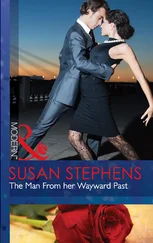1 ...8 9 10 12 13 14 ...20 The lightning came and went once more, a kind of shutter through which they saw each other and then did not. When he was able to focus again he saw her blinking up at him, smiling. He had not seen her smile before and he drank it in, greedy for it. She was so alive, so vibrant before him. He had found her once more. That, in itself, seemed a miracle. He wanted to scoop her up in his arms and twirl her.
I wasn’t sure whether to come over or not , she said.
I’m glad you did.
I used to see you on the news all the time. Before I arrived here, I mean.
He nodded, at first confused. She carried on talking now, listing some of the news reports she’d particularly admired, one of which he hadn’t done at all—it had been a colleague of his at the network—and at some point he realized that when she’d said I know you this is what she’d meant. That she’d seen him on television.
His stomach soured; the euphoria of a few seconds earlier drifted away. He felt himself receding, as though he had somehow been suddenly transported to the ceiling and was now looking down upon himself talking to this woman, a young and attractive woman who had no idea who he was except as he appeared on television when he did his best to sound as much as possible like Walter Cronkite. He wanted to rewind to that moment by the window, or even before when he followed her around the crowded rooms. He found himself shaking his head slowly, unintentionally back and forth. She had no idea who he was. Whatever he thought of their meeting in Con Thien, it held nothing for her. She seemed to him suddenly just like any girl, like anyone else at the party. He watched her grow silent in front of him, aware perhaps that something inside him had shut down, that he was no longer listening.
I’m sorry , he said, his voice filled with disappointment, sounding overly contained, even robotic. I thought you were someone else.
The lights went on again and a great round of applause erupted from the party’s guests. He could see her plainly now, and though the storm continued to rage outside it no longer felt as if it were here in the room, even between them. The record went back on, so loud that the guests raised their voices to shout over the heavy beat. Some began dancing, colliding into those who stood with drinks and some who sat. She leaned toward him so that her mouth was just under his chin, her brow knit, and said in a clipped manner, Then I beg your pardon.
She turned and walked in one deliberate, fluid movement, leaving him unsure whether to follow or let her go. He was angry and he had no right to be angry. He wanted to call to her, even to argue with her, this stranger, a woman whom (he reminded himself now) he did not even know. Unable to get her attention in the din of the party noise, the blaring music, the waves of laughter that seemed to come from the corners of the room, he went after her once more. When he was close enough, he reached forward and touched her shoulder and she turned, her eyes fierce upon his. Now he saw her as he remembered her, the strength of her emotions connecting them. It comforted him somehow, to see her once more as strong and clear as she’d been those weeks ago, not hiding a thing about herself. She could hate him if she wanted; that was understandable. He’d humiliated her—he realized that—but it hadn’t been deliberate and he wanted to tell her so. Instead, what came out was altogether different, a plea from inside him that he hadn’t reckoned on. He said, You were in that bunker by the observation post. We sat across from one another. You don’t remember that?
She looked confused at first and he thought for one brief, dreadful moment that somehow he’d gotten the wrong girl altogether, that it was his mistake. It didn’t seem possible that the girl in the bunker was some other English girl. He knew her face, her eyes. But there was no point in carrying on. It had happened, finally, even inevitably: they had met again. Never in all his imaginings did the event have so little importance.
I’m sorry , he said. Never mind.
He looked down, trying to decide how best to navigate himself away, out of the room, the hall, the hotel. He thought he could go to the bureau, or somewhere.
Then she said, Con Thien?
He felt something between them relax. He looked up and saw her face, the awareness arriving like a slow-growing wave. She began to fidget, holding her elbow with one hand, pressing her fingers over her mouth. She looked at him newly, her eyes scanning his face, his chest, his hands. Finally she said, I remember that.
He hadn’t moved, was standing close, still holding her arm.
She said, I didn’t know it was you. I mean, how would I know? You were covered in dirt. You didn’t have a helmet on and it was all in your hair —Her hands moved to her own hair as she said the words. He felt the corners of his mouth rise, felt a wash of relief. She remembered. He let go her arm now, sure she would remain with him, that whatever would happen now had already begun, had taken hold. She looked down at the floor, a frown of concentration across her brow. I thought you were a marine , she explained.
No —he began.
Your hair is short like a marine and you had a first-aid pouch —
It was a tape recorder. The first-aid pouch is waterproof so I use it —
You weren’t wearing glasses.
They were in my hand.
I was sure —
Susan , he said, the first time he used her name. Think back. I had no weapon.
She looked down at the floor as though searching there for something she had dropped. He saw her shoulders move; she looked up and he realized that she was laughing. He tried to smile but could not. When had his life become so weighted he could not laugh with a beautiful woman?
Oh my God , she said. She sounded happy, relieved, a little overwhelmed, even. I thought I’d never see you again.
The truest advice she ever heard about combat reporting was that if you were really scared, you shouldn’t go. But the amazing thing about being around war so long—one of the amazing things—was how it began to feel normal; healthy fear melted away and was replaced by curiosity. The stories came daily, told at the bar or while waiting at the airport for a lift. They were printed in newspapers, cabled from the offices on Tu Do Street, and with every story of a firefight, a skirmish, a reconnaissance, a bombing mission, a search-and-destroy, came a sense of the increasing normality. It was exactly the way the horses she had trained became used to fire and smoke and crowds and sudden loud sounds: a simple system of approach and retreat. Not that she became immune to fear—in some respects she felt scared all the time—but she reached a place where it arrived too late to keep her from doing the dangerous thing.
She did not feel braver. It was more that over the weeks the battles themselves had moved toward her, moved toward them all, into every city, every ville, so that it no longer seemed such an odd thing to witness and report, then eventually to wait around when a rumor was in the air, and at last to request to be woken at 4 a.m. to go out on an operation. It happened naturally, a slow attrition of common sense.
Now, she packed ace bandages, iodine, cotton. She regarded bits of rope or twine with interest, carried duct tape even though it weighed so much, wore a thin leather belt with a strong buckle. These things became most ordinary, like packing socks or underwear. She didn’t think about why she packed them any more, though if asked she could tell you. Almost all battle deaths are caused by loss of blood.
Читать дальше












